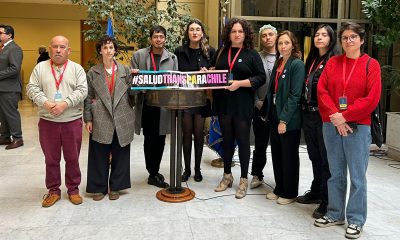News
Peru found responsible for rape, torture of transgender woman
Inter-American Court of Human Rights ruled for Azul Rojas Marín
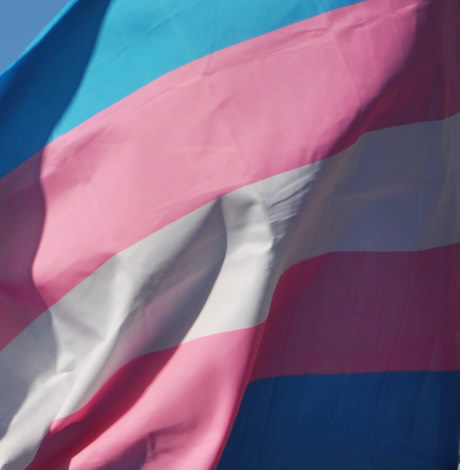
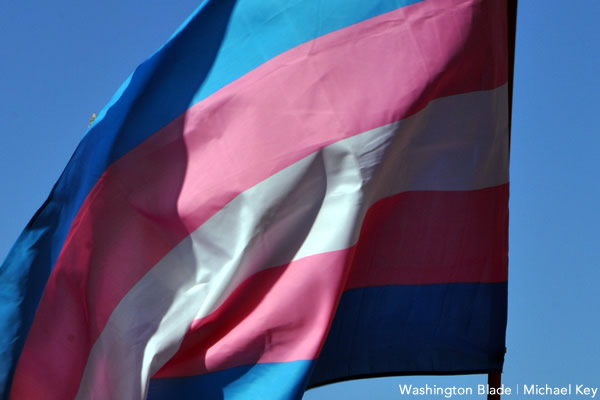
The Inter-American Court of Human Rights has issued a landmark ruling that says Peru is responsible for the rape and torture of a transgender woman.
Azul Rojas Marín alleges police officers in Casa Grande, a town in the La Libertad region of northern Peru that is roughly 370 miles northwest of the country’s capital of Lima, detained her on Feb. 25, 2008. Rojas says she was forcibly stripped and beaten before two officers sodomized her with a police baton.
Rojas filed a formal complaint against the officers two days after the incident took place.
The court’s ruling — released on March 12, but made public on April 6 — notes local prosecutors launched an investigation into Rojas’ allegations, but they later dropped it. Rojas appealed the decision, but a Peruvian court in January 2009 “dismissed the investigation into the crimes of aggravated sexual assault and abuse of power.”
The Inter-American Commission on Human Rights accepted Rojas’ case nearly a decade later.
The ruling orders Peru to “provide medical, psychological and/or psychiatric treatment” to Rojas and to prosecute the officers who tortured her. The ruling also directs Peru to track anti-LGBTQ violence in the country and develop a national strategy to respond to them.
Gabriela Oporto Patroni, a lawyer with Centro de Promoción y Defensa de los Derechos Sexuales y Reproductivos, a Peruvian LGBTQ advocacy group known by the acronym PROMSEX, represented Rojas.
Oporto on April 8 told the Los Angeles Blade during a WhatsApp interview from Lima that Rojas “is very pleased with the sentence.” Oporto also said the ruling sends a strong message to LGBTQ Peruvians who remain disproportionately vulnerable to violence and discrimination because of their gender identity and/or sexual orientation.
“The Peruvian state in the entire process before the court, before the commission, all the time has denied the existence of discrimination against LGTB people in Peru,” Oporto told the Blade.
“It is absolutely false that there is no discrimination against LGTB,” added Oporto. “The court has recognized that this context persists to this day.”
Oporto said Peru has not responded to the ruling.
“We have not had any communication from them,” Oporto told the Blade.
The Organization of American States created the Inter-American Court of Human Rights, which is based in Costa Rica, in 1979 in order to enforce provisions of the American Convention on Human Rights. Peru is among the countries in the Americas that recognize the convention.
The court has previously ruled in favor of LGBTQ rights.
The court in 2018 issued another landmark ruling that recognized same-sex marriage and trans rights in the Western Hemisphere. The court in 2012 ruled in favor of Karen Atala, a judge who lost custody of her three daughters to her ex-husband because she is a lesbian.
The court also works closely with the Inter-American Commission on Human Rights, which has urged countries in the region to decriminalize consensual same-sex sexual relations and address anti-LGBTQ violence and discrimination.
California
Equality California has sponsored 12 bills to advance LGBTQ+ rights in the state
On Feb. 27, the LGBTQ+ civil rights organization announced its 2026 legislative priorities, which cover trans healthcare and queer education.

Nationally, queer and trans people are facing a crisis. Last July, the Trump administration defunded the 988 suicide prevention lifeline for LGBTQ+ youth. Anti-trans hate crimes are on the rise, specifically those targeting Black and brown trans women. Just last week, trans people living in Kansas who had changed their gender designations in the past received abrupt letters stating that their driver’s licenses were no longer valid.
Federal and statewide legislation is targeting LGBTQ+ rights, creating a social landscape that is reverting to sanctioned violence against these communities. In response, LGBTQ+ civil rights organization Equality California has sponsored 12 new bills that are fighting to strengthen queer people’s rights, safety, and sense of stability.
This means “being able to access health care, live free from discrimination, gather safely, and trust that our personal information will not be weaponized against us,” said Equality California’s executive director, Tony Hoang, in a press release. Hoang also states that these bills offer Governor Newsom an “opportunity to define real leadership” and set himself and the state apart from the proliferation of anti-LGBTQ+ rhetoric amongst the most politically elite.
What are the bills and what would they do?
The 12 priority bills Equality California has sponsored span various areas, from healthcare to the criminal justice system and from schools to emergency hotlines.
AB 1876 (Dawn Addis): Protecting transgender patients from discrimination
Introduced on Feb. 12, AB 1876 would prohibit health insurers and plans from discriminating against people based on sexual orientation, gender identity, or sex characteristics. This would help advance the rights of trans, gender diverse/expansive, and intersex (TGI) people across California, allowing them greater accessibility when seeking the healthcare they need.
AB 1930 (Rick Zbur): Protecting transgender patient privacy from out-of-state investigations
Introduced on Feb. 13, this bill was written by Assemblymember and former Equality California executive director Rick Zbur. It focuses on protecting transgender patients who have received gender-affirming care, abortions, or any other form of trans health care in California. AB 1930 will place greater protections on confidential, private medical information, barring out-of-state agencies from readily obtaining these records and using them against trans people.
SB 1114 (Christopher Cabaldon): Protecting LGBTQ+ data privacy
California-based agencies continue to champion research on LGBTQ+ communities, collecting data related to gender and sexual identity. However, there are concerns that federal officials will try to surveil, shut down, or extract this data. SB 1114 would counter this by limiting when state agencies can share this sensitive data and barring the disclosure of such data outside of California.
AB 1540 (Mark González): Restoring the youth crisis support hotline
Since last year, after the administration ended the 988 Suicide and Crisis Lifeline’s specialized services for queer youth, L.A. officials have been advocating for its revitalization. AB 1540 was introduced this January by prominent LGBTQ+ Assemblymember Mark González, and the bill calls for the restoration of the “Press 3” option for queer youth struggling with their mental health. Many have lauded the service’s necessity, urging officials to recognize and take action to address the broader mental health crisis of young LGBTQ+ people across the country.
SB 934 (Scott Weiner): Advocating for conversion therapy survivors
SB 934 aims to extend the statute of limitations so conversion therapy survivors can pursue legal claims against licensed mental health professionals who have subjected them to conversion therapy practices.
In other states, victories against conversion therapy have taken a step backwards. In 2023, conversion therapy was legally banned, to prevent the “horrific practice” from continuing to harm LGBTQ+ youth. This past December, the ban was blocked, on the grounds that it violated First amendment rights for therapists and counselors — even if they engaged in the practice.
AB 1775 (Chris Ward) — Supporting transgender veterans
In January 2025, the Trump administration issued an executive order that barred trans people from serving in the military, stating that the forces had been “afflicted with radical gender ideology.” As a result, tens of thousands of active-duty service members, veterans, and their family members were abruptly cut off from a steady income, putting them at risk of homelessness and financial instability. AB 1775 will make sure trans veterans impacted by the executive order can access housing assistance, employment support, and be able to correct their military orders.
AB 1836 (Jesse Gabriel): Protecting safety of LGBTQ+ community events
This bill intends to expand the state’s Nonprofit Security Grant Program so that organizations can access funding for security efforts when hosting LGBTQ+ community events. Currently, the grant program provides funding for LGBTQ+ community centers and nonprofit facilities, but does not cover off-site events. For queer people celebrating their joy in public, which can be its own act of resistance, the possibility of retaliation leaves in many a remnant of fear and apprehension. This bill combats these fears by creating funding opportunities to ensure proper protections can be accessed at such events.
SB 1023 (John Laird): Creating greater access to injectable PrEP
Assemblymember Laird’s bill proposes improved insurance coverage and reimbursement practices so that healthcare providers can offer long-acting injectable PrEP without being slowed down by financial or administrative barriers.
Community clinics often face the brunt of ineffective insurance reimbursement practices, which blockade and clog their ability to provide HIV preventative medicine. SB 1023 aims to make these processes smoother, ensuring that clinics and providers can provide PrEP in a timely, equitable manner.
AB 908 (Jose Solache): Ensuring LGBTQ+ curriculum is meaningfully adapted
This bill would require California’s Department of Education to make sure school districts are complying with the state’s FAIR Education Act, which calls for curricula to cover the histories and contributions of various marginalized communities, including Black, brown, indigenous, and LGBTQ+ people.
The FAIR Education Act was signed into law in 2011, but AB 908 calls attention to the fact that only 37% of school districts actually implement meaningful LGBTQ+ education in their curricula. The bill reaffirms what has already been legally mandated for 15 years: that school systems concretely cover LGBTQ+ history and contemporary advancement for their students.
SB 1328 (Sabrina Cervantes): Creating more LGBTQ+ outreach for higher-ed students
This bill would require higher education institutions to designate specific confidential employees at satellite campuses, outreach centers, and other external branch facilities to support the needs of LGBTQ+ students and staff.
LGBTQ+ “points of contact” can be found at various primary campuses, and this bill calls for the same measures to be taken at outreach centers related to higher education institutions. SB 1328 argues that more should be done for queer students, faculty, and staff who are present at an institution’s various locations — not just its main campus. It highlights a need for intention and care for queer people’s needs within the education system: cursory attempts at inclusion are not enough.
AB 2014 (Sade Elhawary) — Preventing gender bias in criminal trials
The California Committee on Revision of the Penal Code released its 2025 annual report in December and identified that an important point of reform was the way gender-based evidence is treated in court. AB 2014 would require courts to apply heightened scrutiny — a more demanding form of review that requires substantial evidence — before hearing arguments based on harmful gender-based stereotypes.
SB 1149 (Maria Durazo) — Expand Bereavement Leave for Chosen Family
This bill expands the definition of work-protected bereavement leave to include chosen and extended family members. Currently, California law restricts bereavement leave to immediate family, and does not take into account that queer people are often piecing their own families together after abandonment, estrangement, or fear for their safety and health.
The pain of losing a chosen family member can be just as, if not more, searing and altering than the loss of a blood relative. SB 1149 would protect workers experiencing this kind of grief.
Kristie Song is a California Local News Fellow placed with the Los Angeles Blade. The California Local News Fellowship is a state-funded initiative to support and strengthen local news reporting. Learn more about it at fellowships.journalism.berkeley.edu/cafellows.
Obituary
Appreciating literature’s gay genius, Michael Silverblatt
Journalist Karen Ocamb remembers literary guru and host of KCRW’s Bookworm, and his place among LGBTQ legends.

The superlative does not exist to describe Michael Silverblatt’s passion hosting KCRW’s Bookworm, which the New York Times described as a “literary salon of the air.” Michael died from complications of diabetes at his Fairfax district home on Feb. 14, Valentine’s Day. He was 73.
Many, many famous writers and artists have described their appreciation for Michael’s unique, insightful depth of literary knowledge. Norman Mailer called Michael “the best reader in America.” Susan Sontag called him “a national treasure.” Joyce Carol Oates called him “the very Mozart of literary interviewers.”
“Michael was a genius. He could be mesmerizing and always, always, always brilliant,” Alan Howard, Michael’s friend and Bookworm editor for 31 of the show’s 33 years, told the Los Angeles Times. “It’s an extraordinary archive that exists, and I don’t think anyone else has ever created such an archive of intelligent, interesting people being asked about their work.”
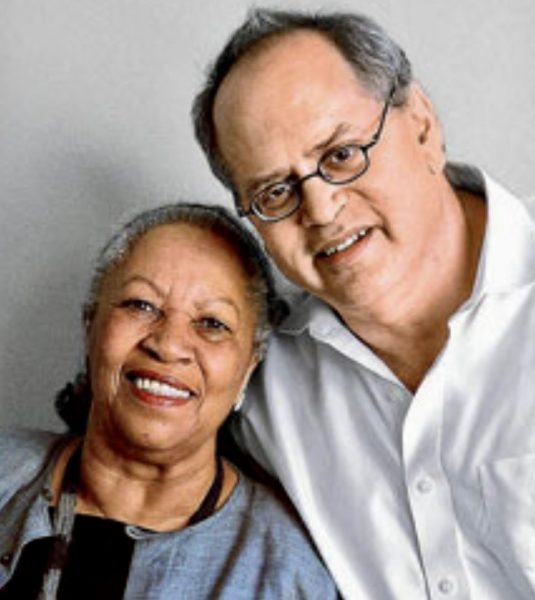
A curious twist of fate landed Michael in what turned out to be his own wonderland, conducting more than 1,600 interviews with brilliant writers and artists such as Joan Didion, Toni Morrison, Susan Sontag, Margaret Atwood, Ann Beattie, Kurt Vonnegut, Salman Rushdie, Gore Vidal, Tom Wolfe, Nobel Prize winner Kazuo Ishiguro, and David Foster Wallace.
Michael was born in Brooklyn, New York, on Aug. 6, 1952, and raised in Queens by parents who were two accountants – children of Russian and Polish immigrants who didn’t quite know what to do with their reclusive, budding gay, Jewish intellect.
“My first crucial book was Alice in Wonderland. My mom used to take me with her to the beauty parlor, and I asked her to get me the big Walt Disney Alice in Wonderland with the colored pictures because it was so pretty and mysterious to me. I remember the Cheshire cat, pink and purple with a heckler’s smile,” Michael told Sarah Fay during an interview at the University of Iowa in 2010. “My mother instead bought me the Lewis Carroll Alice’s Adventures in Wonderland with the black and white Tenniel engravings, and I was very disappointed. She did it not because she had a particular investment in literature but because the Disney was so much more expensive and we were always mindful of our economy.
“And when I finally read it,” he continues, “it took me a good two years—I was absolutely fascinated and perturbed by it, particularly by the section where Alice finds herself in the wood where nothing has a name, and she doesn’t know her own name. The engraving has Alice in the woods with her arms around the neck of a fawn, not strangling the fawn, but embracing it as if for dear life, or as if she doesn’t know if she is a fawn, too. The mystery of reading all of those poems that made less sense if you didn’t know the popular poems they were parodies of made it even stranger. I was absolutely entranced by Alice and Lewis Carroll.”
Through Lewis Carroll’s Symbolic Logic and The Game of Logic, Michael taught himself logic and math. “I developed quite a proficiency for abstract math.”
Intellectual challenges became games when, in junior high, Stephen Sondheim published “Cryptic Crosswords” in New York magazine, and Michael would “enter the words as a knight would move across a chessboard.”
As “[Donald] Barthelme has his Snow White character say in his first novel (1967), I want to hear words I have never heard before. I want the words and sentences to peacock around, to open their plumes,” Michael told Fay. “I have an experience of the book, and it’s as if I have not a flat surface in front of me but rather a beehive around my head. It’s very strange.”

In 1968, after graduating from Bayside High School at age 16, Michael enrolled in SUNY at Buffalo, where authors such as Michel Foucault, John Barth, Donald Barthelme, and J.M. Coetzee were professors. Michael was awkward, shy, and inhibited by a stammer – but he secretly considered the professors friends and spoke with them after class.
During summer vacation, his parents pushed him to be a postal worker with a mail route on the Upper East Side that took him past old bookstores. He subsequently bought the complete works of Charles Dickens while his literary tastes were also expanding to the experimental and avant-garde.
Michael refused to major in business, choosing math as a compromise. But he quickly switched to English, graduating with a BA in 1974. He went for a PhD at Johns Hopkins University but dropped out after a year, paralyzed by writer’s block. “I thought I wanted to be a writer, but that really didn’t turn out to be my gift,” Michael told Kristy Davis for Oprah.com.
After a screenplay he co-wrote received some Hollywood attention, Michael relocated to Los Angeles to pursue his dream of writing scripts and books. But the script wasn’t picked up, and he found himself lost, broke, jobless, and drinking a lot. “At the time,” he told Davis, “I resembled a homeless person who unaccountably had an apartment.”
Michael found a 12 Step program, and his life changed. Friends helped him learn how to take care of himself and found him a job at Freeman & Sutton Public Relations in West Hollywood.
That’s where I met Michael in the mid-80s. Brad Bessey, Michael, and I became the gay troika in that office. I was a fellow 12 Stepper, so Brad and I helped brainiac Michael with living in the real world – like cleaning up crumbs. Showbiz-sharp Brad helped Michael and me with the who’s who in Hollywood. And I learned how to write spin-filled press releases about “causes” like I used to read as a journalist.
“We were odd friends,” Brad remembers about Michael. “Back in the mid-eighties, we met in the glittering churn of celebrity PR. I was young, handsome, brash, and built for the room. Michael, on the other hand, was quieter and a little awkward—as if words lived more comfortably on the page than in the room. I loved his laugh, his intellect, and the way, when I trusted him with my poetry—shared with few—he met it with tenderness: an encouraging question, a precise insight, never once making me feel small. When he landed KCRW’s Bookworm, it felt like a metamorphosis—awkwardness transforming into flight—his brilliance suddenly finding a home, audible at last, lifting literature into the air. And always, that laugh.”
We three broke up in the late 80s: I went to live with Wallis Annenberg in Beverly Hills, intending to write plays; Brad wound up as E!’s Director of Talent & Development where he resurrected Joan Rivers career by putting her on the red carpet; then on to Entertainment Tonight where he encouraged actor Michael Jeter to come out in 1997 as a gay man with HIV/AIDS, and highlighted transgender actor Alexis Arquette.
In 1988, Michael had a famous encounter at dinner in Santa Monica, where he was representing actor Ray Sharkey (Wiseguy). He overheard KCRW’s general manager, Ruth Seymour, talking about Russian poet Osip Mandelstam, a victim of one of Stalin’s purges in the 1930s.

“I had just gotten back from Russia, and we were at this dinner with an actor, a producer, and a director who were talking Hollywood,” Seymour told Lynell George for a 3,596-word LA Times feature on Michael in 1997. “And Michael and I got into this whole discussion about Russian poetry, talking to the exclusion of everyone else. He’s a great raconteur, and so the rest of the world just vanished….So afterward I just turned and asked him: ‘Have you ever thought about doing radio?’”

Soon thereafter, Michael started volunteering as host for Bookworm on KCRW, a public radio station on the campus of Santa Monica College. Five years later, thanks to enthusiastic Lannan Foundation support, he was paid, treated like royalty on college campuses and other venues for the special Lannan Foundation “Readings and Conversations” series, and became syndicated nationally.
“The purpose of the show is to help my listeners look through writers’ eyes,” Michael told The New York Times in 1999.“It’s to show them, whether they’re reading or not, how writers re-enchant the world, how they surround us with the miraculous. That’s what books do to me and what I want my show to do, to remind people how odd and special writers’ minds and imaginations are.”

But Michael also cared about public relations, as he shared with his friend Tosh Berman in this 1987 interview. “For people like me, wearing a sports jacket [for PR work] is like the best rebellion of all,” Michael says. “It’s like wearing a clown suit every single day – and enjoying the formality of it, too. The great joy, as William Burrows pointed out, is to feel completely costumed and to be absolutely anonymous.”
“I care about deeply serious writing in America – dance, art. Why should all sorts of less valuable forms be winning attention in the press and the media when the arts languish in need of budgets and government funds,” he says. “This is very important – that we have a government that supports the arts. But it’s more important that we have a culture that supports the arts.”
However, it needs to be created. “I think it is there but very embryonically,” Michael says. “That’s the kind of thing I’m interested in doing – in helping the arts reach their audience and making that audience aware that, like an addiction to drugs – there are those of us who are art addicts – whose lives are changed by the brilliant people who make new things, new forms, new forms of culture.”

One of Michael’s most famous interviews was with David Foster Wallace in 1996 after the publication of Wallace’s 1078-page ultimate mega-meta novel Infinite Jest. Michael immediately stuns the author by observing that the book was written and structured in fractals. After an awe-struck Wallace agrees and explains, Michael goes deeper.
“[W]e’re entering a world that needs to be made strange before it becomes familiar,” he says. Infinite Jest isn’t difficult “for difficulty’s sake; it seemed like immense difficulty being expended because something important about how difficult it has become to be human needed to be said, and there weren’t other ways to say that.”
Wallace is heard quietly saying, “I feel like I wanna ask you to adopt me.”
Over the years, Michael’s vision becomes clearer. “There are all sorts of other things that you get on radio and television,” he told Oprah.com in 2009, “but I wanted listeners of Bookworm to hear words, ideas, but particularly emotions that don’t get discussed in public, if at all elsewhere. That is to say, for one reason or another, the show is a crusade that’s much larger than the subject of books.”
That includes books by and about LGBTQ+ people. In a 2006 interview, Brokeback Mountain author Annie Proulx shares how Ang Lee’s film Brokeback Mountain reflects her vision that the main romantic characters of Ennis del Mar and Jack Twist are not traditional “cowboys” but poor ranch hands in 1963 rural Wyoming. She’s also annoyed with gay fans who have inundated her with alternative “happy” endings.
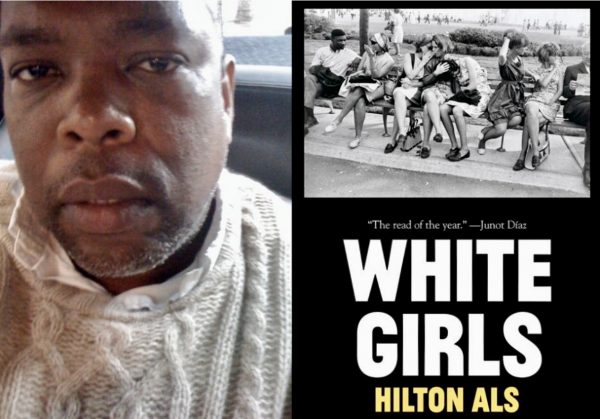
In an introduction to his 2014 interview about Hilton Als’ book, Michael writes: “White Girls (McSweeney’s), his first book in 14 years, is a series of essays that defy easy categorization – in each he takes the risk to say what must be said. Countering books that define ‘blackness’ in the title like Richard Wright’s Black Boy, Als, a black gay male, is interested in making words opaque. He chronicles longing, loss of loved ones, and the establishment of his voice in the New York of the late ’80s and ’90s. He looks back to Richard Pryor and forward to Eminem. His ‘white girls’ are neither necessarily girls nor white. They are Diana Vreeland, Michael Jackson, Truman Capote, and Louise Little. He posits: what if we existed in a world that was not categorizable?’ Wouldn’t we be left with something more humane and complicated?”
Michael is keenly aware of the importance of identity.
“A book about English children in a castle,” he tells the LA Times, “that was the training, when I was young, to imagine a world that didn’t include me. Books and television are our cultural mirrors… and when you look into the mirror, and you don’t see your face, this is possibly a nightmare situation–the act of looking but not finding yourself, or looking and finding yourself where you don’t belong. So until I found books that had a Michael in them, part of me didn’t fully yet exist.”
Finding an image was also startling. “When I learned that there were [such] books–Bernard Malamud, Grace Paley, Henry Roth, that generation of Jewish writers–my first impulse was to resist. ‘This isn’t the castle!’ I was frightened. It was the language I heard around the house. If you’re any kind of minority, to open a book and hear the people around you, your aunts and uncles talking to you . . . that that language should be in a book? I mean, this is an enormous day!”

In 2005, Michael and his team produced a 10-part series entitled Escaping the Cage: Identity, Multiculturalism and Writing, playing off Angelou’s autobiography, I Know Why the Caged Bird Sings about the human desire to make one’s voice heard even when shackled. Michael “inverted the concept: Writers of defined backgrounds — such as ethnicity, gender or sexual orientation — can become imprisoned by it, he believes, an effect of everything from publishers’ marketing strategies to the editing decisions of anthologists,” The Times reported.
“The cage became the cage of ethnicity,” Silverblatt said. “People were being asked to see literature as entirely a matter of identity…. People were not being allowed to be writers. They were being turned into spokespeople.”
Part 6 is devoted to Sexuality and Literary Theory: “James McCourt discusses the emergence of ‘queer identity’ and gives an overview of French literary theories and their influence on multiculturalism–while Camille Paglia explains the destructive nature of such theories. Booker Prize winner Alan Hollinghurst, who writes about the gay experience, reveals that he reads very little popular gay literature. Edmund White explains how he has turned away from the aesthetic and has embraced social realism in his desire to document the AIDS crisis.”

Author John Rechy, famous for the 1963 gay classic City of Night, wrote a letter to Michael agreeing with his premise. Quoting from one of his essays, he writes: “There is a counterattack by the `mainstream’ to consider. One of its main tactics to effect that countering is through the creation of `liberated ghettos’. When book-chains assign labeled sections to `Chicano literature,’ `Gay Literature,’ `Women’s Studies,’ they segregate. So do `mainstream’ publishers who aim minority books only at minorities and who promote such works, if at all, with restricted advertising.” Brad Bessey is now the director of Communications and Talent Relations at Project Angel Food, where he used to volunteer in 1989. And after 46 years as a journalist for the LGBTQ+ community, I am now writing a Substack called LGBTQ+ Freedom Fighters.
And Michael – he found loving friends, deep admiration, and captured his dream. “I’m as fantastical a creature as anything in Oz or in Wonderland,” he told the Cornell University English department in 2010. “I like it if people can say, ‘I never met anyone like him,’ and by that they should mean that it wasn’t an unpleasant experience.”
I never met anyone like him.

This tribute to Michael Silverblatt is cross-posted from Karen Ocamb’s Substack LGBTQ+ Freedom Fighters.

The 2026 Los Angeles Blade Best of LGBTQ LA Awards are here! You submitted your nominations—now it’s time to vote for the finalists. Voting is open through March 6, 2026.
Among some of your favorite categories are Best Drag Performer, Local Influencer of the Year, Best Happy Hour, Go-Go of the Year, Activist of the Year, Public Official of the Year, Best Non-Profit, Best Bartender, Best DJ, Best Local Podcast, and so many more!
Winners will be revealed at the Best of LGBTQ LA celebration on Thursday, March 26 at The Abbey. Stay tuned for more party details coming soon!
Vote using the form below or by clicking HERE.
Here are this year’s nominees!
Best Drag Performer
- Cake Moss
- Charles Galin King
- Kyra Jete
- Laylah Amor
- Misty Violet
Best Drag Show
- Bring It To Brunch at Mattie’s
- Brunch Service at The Abbey
- Hamburger Marys West Hollywood
- Las Reinas at Mickys
- Rocc-ettes at Mattie’s
Local Influencer of the Year
- Charles Hernandez (CnoteLA)
- Curly Velasquez
- Justin Martindale
- Lucas Dell
- Rose Montoya
- Victoria Pousada Kreindler
Best LGBTQ Bar
- Gym Bar
- Kiso Los Angeles
- Mattie’s Weho
- Or Bar
- The Abbey
Best Happy Hour
- 33 Taps
- Fiesta Cantina
- Hi-Tops
- Mickys
- Motherlode
- The Abbey
Go-Go of the Year
- Daniel Mooney
- Gabriel Gonzalez
- Jay Nova
- Prince Joshua
- Steven Dehler
- Victoria Shaw
Best Restaurant
- Bottega Louie
- Hamburger Mary’s
- La Boheme
- Pura Vita
- WeHo Bistro
Best Radio or TV Station
- CHANNEL Q
- KTLA
- LatiNation
- Out TV
- REVRY
Best Cannabis Retailer/Lounge
- Artist Tree Lounge
- Elevate
- Green Qween
- Med Men
- The Woods WeHo
Best LGBTQ Owned Business
- Fan Girl Cafe
- Green Qween
- JJLA
- MISTR
- Wildfang
Best LGBTQ Social Group
- Dark Circle Film Society
- Gay Men’s Chorus of Los Angeles
- NLGJA Los Angeles
- Outloud Sports
- Unique Woman’s Coalition
- WeHo Dodgeball
Best House of Worship
- Congregation Kol Ami
- Founders Metropolitan Community Church Los Angeles
- Hollywood Boulevard Episcopal
- Hollywood United Methodist
- InVision Church Los Angeles
Activist of the Year
- Cory Allen
- Joshua Marin-Mora
- Liliana Perez
- Maebe A. Girl
- Rose Montoya
Public Official of the Year
- CA State Treasurer Fiona Ma
- Chelsea Byers
- John Erickson
- Lindsey Horvath
- Maebe A. Girl
Best Local Pro Sports Team
- Angel City FC
- LA Chargers
- LA Dodgers
- LA Lakers
- LA Rams
- LA Sparks
- Los Angeles FC
Local Ally of the Year
- Abbe Land
- Jessica Steinman
- Kevin De Nicolo
- Lindsey Horvath
- Senator Lena Gonzalez
Best Doctor/Medical Provider
- AIDS Healthcare Foundation
- Better U
- Dr. Eric Chaghouri
- LA LGBT Center
- St. John’s Wellness
- UCLA CARE Center
Most LGBTQ-Friendly Workplace
- AIDS Healthcare Foundation
- City of West Hollywood
- JJLA
- Los Angeles LGBT Center
- Revry
Non-Profit of the Year
- AJ Socal
- Equality California
- Los Angeles LGBT Center
- OutAthletes
- Project Angel Food
- Trans Lifeline
Best Local Actor
- Annie Reznik
- Jason Caceres
- Michael Scott Montgomery
- Nhut Le
- Shaan Dasani
- Trevor Dow
Best Local Theatre
- Celebration Theatre
- Center Theatre Group
- Geffen Playhouse
- International City Theatre
- LA Opera
- Pasadena Playhouse
Local Musical Artist of the Year
- Prince Joshua
- Robert Rene
- Ross Alan
- San Cha
- Tom Goss
Best LGBTQ Event
- Dinah Shore
- GLAAD Awards
- LA Opera Pride Night
- MISTR’s National PrEP Day
- Outloud Music Festival at Weho Pride
- Pride Night by Hyperion LA
Best Regional Pride
- DTLA Proud
- Hermosa Beach
- Long Beach Pride
- Palm Springs Pride
- WeHo Pride
Best Promoter of the Year
- Andres Rigal
- Ash Rodriguez
- Beau Byron
- Joshua Flores
- Paul Nicholls
LGBTQ Professional of the Year
- Cory Allen
- Erik Braverman
- Kathleen Rawson
- Liliana Perez
- Michael Ferrera
- Tristan Schukraft
Best Bartender
- Alex Satoshi DiDio
- Danny Hernandez
- Manny De Cielo
- Matt Stratman
- Michael Susi
- Michael Vega
Best DJ
- Boy Apocalypse
- DJ Les Ortiz
- DJ SRO
- Lord Izac
- Simon Harrison
Best Local LGBTQ Podcast
- BabyGay
- No Matter What Club
- No Matter What Recovery
- On The Rocks
- Sloppy Seconds Podcast
- Very Delta
Best Salon/Spa
- Bautis LA
- Folklore Salon & Barber
- Project Q
- Shorty’s Barber Shop
- The Massage Company WEHO
Best Music Venue
- The Disney Concert Hall
- The Hollywood Bowl
- The Roxy Theatre
- The Troubadour
- The Wiltern
Best Fitness/Workout Spot
- Barry’s WEHO
- Equinox on Sunset
- Gold’s Gym
- John Reed Fitness
- LA Fitness, Hollywood
Best Hotel
- Andaz
- Edition Hotel
- Hotel Ziggy
- Kimpton La Peer Hotel
- SoHo House
Books
New book profiles LGBTQ+ Ukrainians, documents war experiences
Tuesday marks four years since Russia attacked Ukraine

Journalist J. Lester Feder’s new book profiles LGBTQ+ Ukrainians and their experiences during Russia’s war against their country.
Feder for “The Queer Face of War: Portraits and Stories from Ukraine” interviewed and photographed LGBTQ+ Ukrainians in Kyiv, the country’s capital, and in other cities. They include Olena Hloba, the co-founder of Tergo, a support group for parents and friends of LGBTQ+ Ukrainians, who fled her home in the Kyiv suburb of Bucha shortly after Russia launched its war on Feb. 24, 2022.
Russian soldiers killed civilians as they withdrew from Bucha. Videos and photographs that emerged from the Kyiv suburb showed dead bodies with their hands tied behind their back and other signs of torture.

Olena Shevchenko, chair of Insight, a Ukrainian LGBTQ+ rights group, wrote the book’s forward.

The book also profiles Viktor Pylypenko, a gay man who the Ukrainian military assigned to the 72nd Mechanized Black Cossack Brigade after the war began. Feder writes Pylypenko’s unit “was deployed to some of the fiercest and most important battles of the war.”
“The brigade was pivotal to beating Russian forces back from Kyiv in their initial attempt to take the capital, helping them liberate territory near Kharkiv and defending the front lines in Donbas,” wrote Feder.
Pylypenko spent two years fighting “on Ukraine’s most dangerous battlefields, serving primarily as a medic.”
“At times he felt he was living in a horror movie, watching tank shells tear his fellow soldiers apart before his eyes,” wrote Feder. “He held many men as they took their final breaths. Of the roughly one hundred who entered the unit with him, only six remained when he was discharged in 2024. He didn’t leave by choice: he went home to take care of his father, who had suffered a stroke.”
Feder notes one of Pylypenko’s former commanders attacked him online when he came out. Pylypenko said another commander defended him.
Feder also profiled Diana and Oleksii Polukhin, two residents of Kherson, a port city in southern Ukraine that is near the mouth of the Dnieper River.
Ukrainian forces regained control of Kherson in November 2022, nine months after Russia occupied it.
Diana, a cigarette vender, and Polukhin told Feder that Russian forces demanded they disclose the names of other LGBTQ+ Ukrainians in Kherson. Russian forces also tortured Diana and Polukhin while in their custody.
Polukhim is the first LGBTQ+ victim of Russian persecution to report their case to Ukrainian prosecutors.

Feder, who is of Ukrainian descent, first visited Ukraine in 2013 when he wrote for BuzzFeed.
He was Outright International’s Senior Fellow for Emergency Research from 2021-2023. Feder last traveled to Ukraine in December 2024.
Feder spoke about his book at Politics and Prose at the Wharf in Southwest D.C. on Feb. 6. The Los Angeles Blade spoke with Feder on Feb. 20.
Feder told the Blade he began to work on the book when he was at Outright International and working with humanitarian groups on how to better serve LGBTQ+ Ukrainians. Feder said military service requirements, a lack of access to hormone therapy and documents that accurately reflect a person’s gender identity and LGBTQ+-friendly shelters are among the myriad challenges that LGBTQ+ Ukrainians have faced since the war began.
“All of these were components of a queer experience of war that was not well documented, and we had never seen in one place, especially with photos,” he told the Blade. “I felt really called to do that, not only because of what was happening in Ukraine, but also as a way to bring to the surface issues that we’d had seen in Iraq and Syria and Afghanistan.”

Feder also spoke with the Blade about the war’s geopolitical implications.
Russian President Vladimir Putin in 2013 signed a law that bans the “promotion of homosexuality” to minors.
The 2014 Winter Olympics took place in Sochi, a Russian resort city on the Black Sea. Russia annexed Crimea from Ukraine a few weeks after the games ended.
Russia’s anti-LGBTQ+ crackdown has continued over the last decade.
The Russian Supreme Court in 2023 ruled the “international LGBT movement” is an extremist organization and banned it. The Russian Justice Ministry last month designated ILGA World, a global LGBTQ+ and intersex rights group, as an “undesirable” organization.
Ukraine, meanwhile, has sought to align itself with Europe.
Ukrainian President Volodymyr Zelenskyy after a 2021 meeting with then-President Joe Biden at the White House said his country would continue to fight discrimination based on sexual orientation and gender identity. (Zelenskyy’s relationship with the U.S. has grown more tense since the Trump-Vance administration took office.) Zelenskyy in 2022 publicly backed civil partnerships for same-sex couples.
Then-Ukrainian Ambassador to the U.S. Oksana Markarova in 2023 applauded Kyiv Pride and other LGBTQ+ and intersex rights groups in her country when she spoke at a photo exhibit at Ukraine House in D.C. that highlighted LGBTQ+ and intersex soldiers. Then-Kyiv Pride Executive Director Lenny Emson, who Feder profiles in his book, was among those who attended the event.
“Thank you for everything you do in Kyiv, and thank you for everything that you do in order to fight the discrimination that still is somewhere in Ukraine,” said Markarova. “Not everything is perfect yet, but you know, I think we are moving in the right direction. And we together will not only fight the external enemy, but also will see equality.”
Feder in response to the Blade’s question about why he decided to write his book said he “didn’t feel” the “significance of Russia’s war against Ukraine” for LGBTQ+ people around the world “was fully understood.”
“This was an opportunity to tell that big story,” he said.
“The crackdown on LGBT rights inside Russia was essentially a laboratory for a strategy of attacking democratic values by attacking queer rights and it was one as Ukraine was getting closet to Europe back in 2013, 2014,” he added. “It was a strategy they were using as part of their foreign policy, and it was one they were using not only in Ukraine over the past decade, but around the world.”
Feder said Republicans are using “that same strategy to attack queer people, to attack democracy itself.”
“I felt like it was important that Americans understand that history,” he said.
California
Experts discuss pathways forward as anti-trans violence continues to rise
On Thursday, Feb. 19, the Williams Institute invited a panel of local experts to discuss the rise in anti-trans hate crimes, and ways communities can seek refuge and support.

During a recent webinar hosted by the Williams Institute, a local LGBTQ+ policy think tank, several policy experts, law scholars, and advocates gathered online to discuss violence against transgender people in California as well as potential solutions to navigate the year ahead.
Here are important updates gathered from the session. These expand on an earlier Blade article about the increase in reported hate crimes and incidents against trans people since 2013.
What we’re familiar with: trans people face higher rates of victimization and violence
llan H. Meyer, the Williams Distinguished Senior Scholar of Public Policy at the Williams Institute, utilized data collected by the 2022-2023 National Crime Victimization Survey (NCVS) and the 2022 U.S. Transgender Survey (USTS) to re-solidify the lived experiences of trans Angelenos and Californians.
The reality is: transgender, gender expansive, and intersex (TGI) communities face much higher rates of violence compared to cis people who are not queer-identifying.
Out of the 9,146 Californian respondents who participated in the national USTS, 19% of those surveyed reported that they received threats of violence. 38% reported facing verbal harassment, and 42% experienced online harassment. Overall, nearly 60% of the TGI people surveyed experienced some form of violence, threatening behavior, or harassment.
And for Black and brown trans women, whose experiences of transphobia may also coincide with misogynoir, racism, and anti-immigration rhetoric, they are at an even greater risk when it comes to experiencing violence and harassment.
Why is there an increase in violence against trans people?
When the webinar’s moderator, Senior Scholar of Public Policy Ayden Scheim, posed this question, Meyer pointed to the political “scapegoating” of trans people in the U.S. Under the current administration, there is a proliferation and mobilization of anti-LGBTQ+ hate that is especially rooted in anti-trans bias.
The higher numbers in recent data can also be explained by increased training for police when it comes to investigating and reporting anti-trans hate crimes and incidents. This could also be because more people are willing to report the violence they face.
Historically, though, TGI people report higher rates of distrust when it comes to seeking support from the police, so they often underreport the violence they experience. While researchers are working hard to collect a more “complete record” and a full portrait of anti-trans hate and violence, there are factors that can limit this work.
“Not everybody reports, not everybody who reports is assessed to actually be a hate crime, and not everybody who is assessed to be an actual hate crime is actually reported upward so that it gets into the data,” Meyer explained, detailing the difficulties researchers can face when trying to piece together a more “complete record” and full portrait of anti-trans hate and violence.
There is a “gap between legal protection and lived safety.”
Much of the distrust trans people experience when it comes to police and officials is a product of systems that have proven to be hostile towards trans people. “I feel like that tells us something that’s really important. Violence is not some random act…It is a pattern. It is structural. It interacts with social perceptions and economic vulnerability,” said Pamuela Halliwell, the Director of Behavioral Health Services at the San Diego LGBT Community Center.
Halliwell described her work as existing at the crossroads between behavioral health, community practice, and research, allowing her intimate insight into the tedious, chronic “hypervigilance” many trans people begin to embody as they face increased fear and stress from the threat of violence.
“It looks like people are being removed from their homes. It looks like fear, shame,” Halliwell described. “It looks like discrimination that feels overwhelming and contributes to a host of other mental health symptoms that become overwhelming and damaging. It looks like housing instability. It looks like communities are carrying communicative stress.”
While acknowledging that California has some of the strongest legal frameworks for trans people, Halliwell explained that there is a gap between stronger protections and the still prominent and tangible violence trans people face. She pointed towards a need for accessible survivor-centered reporting systems, making sure people know that these resources are available and ensuring that data collection and analysis moving forward really centers people across all gender identities.
How do we address our “structural vulnerability” and lean into different avenues of care?
Alec Watts, Assistant Deputy Director of Research and Policy at the California Civil Rights Department (CRD), explained that the department conducts extensive outreach to make sure communities and organizations are empowered with inclusive education. Part of this includes attending events as well as hosting trainings to educate people about civil rights protections, human trafficking, housing, and hate violence.
There are also direct ways members of the public can make their voice heard.
File a complaint
Watts explained that people are encouraged to file a complaint with the CRD directly if they believe their rights were violated. The department is in charge of investigating thousands of these complaints, and can provide mediation and, potentially, help file lawsuits in court on behalf of victims.
Consult in the CRD’s Community Conflict Resolution Unit
These are free, confidential resolution services intended to help community members when people are experiencing fear, conflict, or tension. Members of this unit can help facilitate discussion after an incident occurs, provide educational materials, and can assist schools in mediating tension between students, adults, or both.
Seek anonymous support through the California vs Hate hotline
The CRD operates the non-emergency reporting hotline for anyone in the state who has experienced or witnessed a hate crime or incident. But Watts stresses that this is more than just a reporting hotline — once you make a report, you are connected with a trauma-informed care coordinator who can connect you with legal, financial, mental health, or mediation resources. Services are free and available, regardless of gender, sexual orientation, race, or immigration status. Reports can be made at the website or on the phone, at 8338-NO-HATE.
“Our psyche cannot function in survival mode forever,” Halliwell said, pointing to a sustained fear that trans people navigate the world with. As severe and real as these fears are, Halliwell also clarified that TGI communities are not solely defined by harm. “The data [also] reflects a community that continues to show up, build networks, create chosen families, and demand better systems…It also highlights where intervention is possible. Structural vulnerability can be addressed, prevention is possible, and community care is real and expanding.”
Kristie Song is a California Local News Fellow placed with the Los Angeles Blade. The California Local News Fellowship is a state-funded initiative to support and strengthen local news reporting. Learn more about it at fellowships.journalism.berkeley.edu/cafellows.
Mexico
US Embassy in Mexico issues shelter in place order for Puerto Vallarta
Mexican soldiers killed powerful cartel leader on Sunday

Editor’s note: This article has been updated.
The U.S. Embassy in Mexico on Sunday urged Americans in the resort city of Puerto Vallarta to shelter in place after Mexican authorities killed a powerful cartel leader.
The Washington Post reported Mexican soldiers on Sunday killed Nemesio Rubén Oseguera Cervantes, the head of the Jalisco New Generation Cartel known as “El Mencho,” in Tapalpa, a town south of Guadalajara, the capital of Mexico’s Jalisco state.
Puerto Vallarta is in Jalisco, but is roughly five hours away from Tapalpa.
Local media reports indicate cartel members in response to Oseguera’s killing have set fire to cars and buses in Puerto Vallarta and elsewhere in Jalisco and in other cities across Mexico. The U.S. Embassy’s shelter in place directive also includes Baja California and Quintana Roo states and parts of Guanajuato, Guerrero, Michoacán, Oaxaca, Nuevo León, and Tamaulipas states.
The Mexican border cities of Tijuana and Tecate are in Baja California. The resort cities of Cancún, Playa del Carmen, Tulum, and Cozumel are located in Quintana Roo in the Yucatán Peninsula.
Security Alert – Update: Ongoing Security Operations – U.S. Mission Mexico (February 22, 2026)
Locations: Widespread, including Jalisco State (including Puerto Vallarta, Chapala, and Guadalajara), Baja California State (including Tijuana, Tecate, and Ensenada), Quintana Roo… pic.twitter.com/vwxfOSF6iJ
— Embajada de EE.UU. en México (@USEmbassyMEX) February 22, 2026
“While no airports have been closed, roadblocks have impacted airline operations, with some domestic and international flights cancelled in both Guadalajara and Puerto Vallarta,” reads the advisory. “All taxis and ride shares are suspended in Puerto Vallarta. Some businesses have suspended operations.”
Mantamar Beach Club in Puerto Vallarta’s Zona Romántica, an area in which several gay bars, hotels, and nightclubs are located, is among the businesses that closed on Sunday.
“Due to circumstances beyond our control and road blockages currently affecting the city of Puerto Vallarta, Mantamar Beach Club will remain closed today,” said Mantamar Beach Club on its Facebook page. “This decision has been made in order to prioritize the safety and mobility of our guests, staff, and visitors.”
Giovanni Rocco, a member of the board of directors of the Capital Pride Alliance the group that organizes D.C.’s Pride events, and his partner were in their Airbnb near Zona Romántica at around 10:30 a.m. local time (8:30 a.m. PT) when a friend texted them and asked if they were “okay.” They went up to the roof of their building and saw “fires all across the city.”
“The day’s been pretty wild,” Rocco told the Washington Blade during a FaceTime interview that took place shortly after 7 p.m. local time (5 p.m. PT.) “[We] did not expect to wake up to fires and explosions and gunfire across the city.”
Rocco said he and his partner saw fires from cars that had been set ablaze from their building. Rocco said at one point he saw one of the “big pharmacies here that was set on fire,” but he was uncertain whether someone deliberately set it on fire or whether a car in flames did.
Here’s a look at Puerto Vallarta today. We woke up to find smoke rising from different parts of Zona Romántica. As the afternoon went on, we started to hear more explosions and gunfire. About an hour and a half ago, a Navy helicopter circled the area for a few minutes. pic.twitter.com/T9vwlzdnq3
— Giovanni Rocco (@GRoccooo) February 23, 2026
“We’ve been in our building the entire day — entire in our unit or up on the rooftop to check things out, but we’ve been following that local and State Department guidance and sheltering in place,” Rocco told the Blade.
He said it was “a beautiful week, wonderful weather, sunny. It’s been in the 70s all week. It’s just perfect weather.” Rocco told the Blade that he and his partner on Saturday had dinner on the beach before they went to a couple of bars.
“Everything was fine and normal and great,” he said. “To wake up to this reality, it (definitely) shook (us) up a bit.”
Rocco and his partner had been scheduled to fly back to D.C. on Monday, but their fight was cancelled. The embassy on Tuesday lifted its shelter in place order.
“Public transportation and businesses continue to return to normal operations following a law enforcement operation that took place on Feb. 22,” said the embassy on X. “U.S. citizens are no longer urged to shelter in place.”
National
LGBTQ+ activists mourn the Rev. Jesse Jackson
Prominent civil rights leader died on Tuesday at 84

LGBTQ+ rights advocates have joined the nation’s civil rights leaders in reflecting on the life and work of the Rev. Jesse Jackson, the famed U.S. civil rights leader whose family announced passed away on Feb. 17 at the age of 84.
Known as a follower and associate of African American civil rights leader Dr. Martin Luther King Jr., Jackson emerged in the 1960s as a leading civil rights advocate for the Black community and other minorities for decades throughout the U.S., including in Washington.
In a less known aspect of Jackson’s involvement in politics, following his campaigns for U.S. president in 1984 and 1988, Jackson won election in 1990 as the District of Columbia’s shadow senator, a ceremonial position created to lobby Congress for D.C. statehood.
Jackson, who at that time had a home in D.C., received strong support from D.C. voters, including LGBTQ+ voters who became aware of Jackson’s support for LGBTQ+ issues. He served just one six-year term as the city’s shadow senator before choosing not to run again.
An early supporter of marriage equality, Jackson was among the prominent speakers at the 1987 National March on Washington for Lesbian and Gay Rights. Jackson joined other speakers at a rally on the grounds of the U.S. Capitol.
During his run for president in 1988 the D.C. Gertrude Stein Democratic Club, an LGBTQ+ group that has since been renamed the Capital Stonewall Democrats, endorsed Jackson for president ahead of the city’s Democratic presidential primary.
“The fight for justice requires courage, hope, and a relentlessness that will not be denied. Rev. Jesse Jackson embodied that fight every day,” said Kelley Robinson, president of the Human Rights Campaign, the nation’s largest LGBTQ+ advocacy organization.
“From disrupting political systems and building people power to helping this country imagine a freer future for all of us, Rev. Jackson was a force,” Robinson said in a statement. “His historic presidential campaigns paved the way for generations of Black leaders to imagine ourselves in rooms we were once told were closed to us.”
Robinson added, “Reverand Jackson also stood up when it mattered; when it wasn’t easy and when it wasn’t popular. His support for marriage equality and for LGBTQ+ people affirmed a simple, powerful truth: our liberation is bound together.”
She also pointed to Jackson’s support for efforts to repeal California’s Proposition 8, a 2008 referendum passed by voters to ban same-sex marriage in the state.
“Marriage is based on love and commitment, not on sexual orientation. I support the right for any person to marry the person of their choosing,” Robinson quoted Jackson as saying in support of efforts that succeeded in overturning the California marriage ban.
The national organization PFLAG, which represents parents, friends, and allies of the LGBTQ+ community, released a statement from its president, Brian K. Bond, citing Jackson’s longstanding support for the LGBTQ+ community.
“Today, as we learn of the passing of Rev. Jesse Jackson, we mourn the loss of a giant among us,” Bond said in the statement. “When many refused to acknowledge the existence and struggles of LGBTQ+ people, Rev. Jackson saw us, affirmed us, and demanded equality inclusively,” Bond said. “In his address to the Democratic National Convention in 1984, Rev. Jackson named us specifically as part of the fabric of the American Quilt,” Bond says in his statement.
The statement adds, “He has shown up for and marched with the LGBTQ+ movement through the AIDS crisis, marriage equality, and ever after. Rev. Jackson’s leadership and allyship for LGBTQ+ people will be felt profoundly by his PFLAG family. We will continue to honor his legacy as we continue to strive to achieve justice and equality for all.”
D.C. Mayor Muriel Bowser, citing Jackson’s role as a D.C. shadow senator, said for many in the country, Jackson “was the first person they heard make the case for D.C. statehood. The first person they heard say: it’s the right thing to do.”
Bowser added, “In 1988, he said that we were at a crossroads, and he posed this question: Shall we expand, be inclusive, find unity and power; or suffer division and impotence? It is a question as relevant today as when he asked it,” the mayor said, “And in Rev. Jackson’s name and memory, we must continue fighting for the answer we know our nation deserves.”
D.C. Congressional Delegate Eleanor Holmes Norton (D) said she was honored to have worked with Jackson during his tenure as D.C. shadow senator and throughout his years as a civil rights advocate.
“From the front lines of the civil rights movement to national campaigns that expanded the political imagination of this country, Jesse Jackson lifted up the voices of those too often unheard,” Norton said in a statement. “He turned protest into progress and transformed moral conviction into political action”
According to Norton, “His work-built bridges across race, class, and geography, helping redefine what inclusive democracy could look like in America.”
Los Angeles
Nikko LaMere’s photo exhibit “JOY!” documents the euphoria of Black queer nightlife
Now available to view at the LA LGBT Center, “JOY!” is a raw preservation of Black queer nightlife, fantasy and self-discovery.

It’s 2018, inside queer dance party Ostbahnhof, and the floor is packed with a sweaty, hypnotic energy as people groove to the sexy, lush soundscapes of techno and deep house. Photographer and visual artist Nikko Lamere rushes to grab their disposable camera, accidentally spilling some of their whiskey ginger on someone, and snaps a couple of shots of their friends: immortalizing their uninhibited joy and movement forever.
Eight years later, these photos LaMere captured across various local queer dance parties comprise their newest and largest photo exhibition yet: “JOY!” Displayed at the Los Angeles LGBT Center, “JOY!” is a raw documentation of Black queer nightlife, fantasy, and euphoria. It includes two of LaMere’s major bodies of work and follows the artist’s queer journey and creative evolution.

The exhibit’s opening on Feb. 13 is one of two events in the Center’s “Highly Favored” programming series that uplifts Black queer liberation every February. The next event comes this Saturday, and is a celebratory dance party akin to the ones documented in LaMere’s photos.
Prior to this exhibit, LaMere was most known for their saturated and stylized editorial work with contemporary music phenoms like Doja Cat, SZA, Latto, Billie Eilish and Kehlani. Propelled at a young age into flashy spaces with modern-day tastemakers and legends, LaMere sought refuge in photography throughout their adolescence. Their fascination with the camera began in elementary school while growing up in Culver City, when their grandmother gifted them a Nickelodeon-themed camera to take photos with.
Their eye and talent were reinforced with praise, and this love for the craft grew from curiosity to solace in high school. Bullied for being gay and femme, LaMere sought refuge at the library, where they first discovered the technicolor, surreal work of visionary photographer David LaChapelle. This became a direct pathway for LaMere’s own career: one that, though successful and fulfilling in its own way, led to a need for change.
For so long, the camera was a means to fulfill someone else’s vision. Now, LaMere began to use it as a tool for connection and raw documentation. In 2018, they didn’t set out to create what is now their “In the Night” photo series; they were simply trying to explore their own queer journey, and preserve the friendships and environments that made them feel comfortable in their own skin.
That vulnerable process of “becoming” is one they hadn’t touched upon in their previous work. For the first time, they couldn’t carefully and methodically create the shot; whatever they snapped was based purely on instinct, a fleeting moment of true and embodied tenderness, ecstasy, and freedom.
“To have this body of work shot all in black-and-white, for it to be so gay and Black — it feels really affirming,” LaMere said. “These are the most raw images and things I could create. There’s no Photoshop. There’s no retouching. It’s literally straight from the camera. It just is. I think part of joy is being able to just be, and that’s what these images are.”

“JOY!” also includes LaMere’s work, “Queer Fantasy,” a collection of 40 black-and-white film portraits and interviews with local queer performers, artists, and everyday people. This newer project grew from the core of “In the Night,” and is another intentional project focused on highlighting the beauty and individuality of queer Angelenos. Each person is asked: “What is your queer fantasy?,” illustrating that queer fantasy is not only a transformative kind of rebirth: it is a process built by radical efforts to cultivate joy, success, and safety in the face of violence and discrimination.
For LaMere, “JOY!” is about this process and the moments of self-discovery found on the dance floor, where you can really feel tethered to the person you’re becoming while “the world is burning around you.” While speaking with LaMere, I am grounded by the words of DJ, artist and organizer Darryl DeAngelo Terrell.
“Here, in this space we as black people [are] forced to find liberation in our own bodies, it’s in us, deeper than melanin, and it is activated by bodily acts,” Terrell writes. “We Move* in ways that others can not fathom to understand. Through these acts, we find the most beautiful yet temporary forms of true freedom; we find joy, peace in these acts.”
“JOY!” is available to the public on Wednesdays and Thursdays from 11 a.m. to 4 p.m. More information about the exhibit and “Highly Favored” can be found here. This Saturday’s queer dance party will also honor special guests Hailie Sahar, a starlet on the revolutionary FX show Pose, as well as filmmaker and ballroom culture documentarian Elegance Bratton.
Kristie Song is a California Local News Fellow placed with the Los Angeles Blade. The California Local News Fellowship is a state-funded initiative to support and strengthen local news reporting. Learn more about it at fellowships.journalism.berkeley.edu/cafellows.
Los Angeles
A new “queer summer camp” cycling event rises from the legacy of AIDS/LifeCycle
The LA LGBT Center will host its first ever “Center Ride Out,” a 3-day community cycling adventure from Los Angeles to San Diego.

On April 24, 500 cyclists will meet at Elysian Park before dawn, stretching and preparing for a 110-mile ride through urban scenery and rolling hills. They will be part of the Los Angeles LGBT Center’s inaugural “Center Ride Out,” a 3-day journey that takes riders through Los Angeles and Temecula, reeling to a stop at the San Diego LGBT Community Center.
The cycling adventure is a rejuvenating, communal queer experience that taps into the importance of shared joy and advocacy in the fight to defend LGBTQ+ rights. Its roots are sacred for many queer elders: Center Ride Out rises from the legacy of the cherished AIDS/Life Cycle (ALC), a seven-day cycling adventure from San Francisco to L.A. that formed in 1994 and ended with its last ride in 2025.
In its 31-year run, ALC riders raised over $300 million for HIV and AIDS resources, services, and awareness. This year, Center Ride Out provides a new, exciting extension of this important event, allowing cyclers to raise funds in support of the LA LGBT Center, The San Diego LGBT Community Center, and the LGBTQ Community Center of the Desert.
This support is crucial as LGBTQ+ organizations face a new crisis: widespread defunding. In the last fiscal year, the LA LGBT Center lost $9 million in federal support, according to its CEO Joe Hollendoner. The funding raised by Center Ride Out’s participants will help offset this loss and keep the organization’s various programs and services, from gender affirming care and HIV prevention resources to LGBTQ+ senior and youth support, afloat. “We anticipate further divestment in our work by the Trump administration, [so Center Ride Out] allows people to align their own personal passions with our mission in a broader way,” Hollendoner told the Blade.
Altogether, Center Ride Out participants will cover nearly 200 miles of ground together. At the end of the first 110-mile day from L.A. to Temecula, where riders will get to look at historic landmarks and embark on a museum lunch stop together, the day culminates at campgrounds at Lake Skinner.
Here, riders can take a full rest day at their lakeside camp, where it will exude queer summer camp vibes. There will be massage and medical services, arts and crafts activities, dance parties, and time to relax and connect with the community. “Folks [can] build relationships, have some fun, and feel safe. That’s a feeling a lot of people [need] right now, especially our trans and nonbinary siblings,” Hollendoner said.
Day 3 ends with an 87-mile downhill, coastal ride through the town of Rainbow in northern San Diego County, before ending with a celebratory bash at the San Diego LGBT Community Center.
Hollendoner rode ALC five times while it was active and is excited to be part of this new legacy from its very beginning. “I’ve heard our community elders talk about how powerful it was to be at the start of AIDS/LifeCycle, and the idea that I can be here at the start of Center Ride Out, an event that I hope will go for three decades or longer…It feels really exciting to me,” Hollendoner said.
For newcomers and experienced cyclists alike, Center Ride Out aims to provide an accessible experience: paring down the initial weeklong ALC ride to three days. To take part, cyclists are expected to raise $2,500 by April 10. For those who may struggle to reach this minimum, staff members have established a community fund.
The community fund will also provide scholarships for BIPOC, trans, women, and femme participants — historically underrepresented communities at ALC — as well as microgrants for BIPOC and trans-led teams to encourage a diverse range of cyclists.
Come April, scores of queer cyclists will get to experience this adventure together: one that is both storied and fresh in its purpose, lineage, and joyful expression of queer togetherness. “Center Ride Out is providing an exciting opportunity for people to not only fight back and be in community with one another, but to build resiliency and be surrounded by people who share values around liberation,” Hollendoner said.
To learn how to register, donate to or volunteer for Center Ride Out, more information can be found here. The three-day adventure takes place from April 24 to April 26.
Kristie Song is a California Local News Fellow placed with the Los Angeles Blade. The California Local News Fellowship is a state-funded initiative to support and strengthen local news reporting. Learn more about it at fellowships.journalism.berkeley.edu/cafellows.
Los Angeles
Stonewall Young Democrats bounces back from “quiet year” with Hero Awards

On Saturday, Feb. 7, the Stonewall Young Democrats (SYD), an organization that mobilizes and fosters community for young, LGBTQ+ people, hosted its “Hero Awards” ceremony at Beaches West Hollywood. Under luminous pink light, vibrant crowds of community members showed up to support and celebrate people and organizations spearheading LGBTQ+ visibility, change, and livelihood across L.A. County. Political figures filled the venue wall to wall, including LA Mayor Karen Bass, West Hollywood Mayor John Heilman, West Hollywood Council Member John Erickson, and California Assemblymember Rick Zbur.

Several local advocates and politicians were honored for their queer advocacy and leadership, including City of Los Angeles LGBTQ+ community affairs liaison Carla Ibarra, L.A. Democratic Party Chair Mark Ramos, Congressman Mark Takano, and L.A. County LGBTQ Commission Chair Sydney Rogers. The Los Angeles Blade was also recognized with an Impact Award.
Los Angeles Blade publisher Alexander Rodriguez accepted the award. In his acceptance speech, Rodriguez shared, “We report on and share the struggles of our queer community. We also get to see the resilience and strength our community has, even in the face of adversity. We see firsthand the importance of the Stonewall Young Democrats and the amazing network of people they have put together, as seen here today.”

The Stonewall Young Democrats formed in 2004, immortalizing the 1969 Stonewall riots in its name. The decision to carry the legacies of early gay rights movements is poignant: queer resistance and their enduring battle against political and social marginalization and violence are seared into the organization’s core.
SYD’s President Kanin Pruter is keeping this link to the past alive; it’s a reminder of the interconnectedness of the queer community. “Our history is there for a reason,” Pruter told the Blade. “Without lesbians during the AIDS crisis, we would not be where we are today. And our movement was started by Black trans women.”
This recent Hero Awards marks SYD’s revitalization. After a relatively quiet year, its board is excited to grow its organization, recruit diverse and eager LGBTQ+ folks, and create fruitful opportunities for everyone in the organization to develop their political advocacy and organizing skills.

Most importantly, Pruter hopes that SYD can be a safe, inclusive, and accessible space for any LGBTQ+ person who has felt outcast before. “In a loving and joking way, we’re an island of misfit toys,” Pruter said, who is intentional about creating environments where queer folks who have experienced trauma, isolation, and exclusionary social politics can fit in and belong.
“I want folks to be open, vulnerable and leave any preconceived notions at the door. We come in here [and] we are who we are. We respect each other’s identity, and we’re here to foster a culture where everyone feels welcome.”
Pruter encourages young LGBTQ+ people who are interested in getting involved in SYD, to contact him and learn more about the organization. More information can be found here.
Kristie Song is a California Local News Fellow placed with the Los Angeles Blade. The California Local News Fellowship is a state-funded initiative to support and strengthen local news reporting. Learn more about it at fellowships.journalism.berkeley.edu/cafellows.
-

 a&e features22 hours ago
a&e features22 hours agoAmy Madigan finds herself on the cusp of Oscar glory. Can she overcome the historic bias against horror performances?
-

 LGBTQ+ Youth Mental Health5 days ago
LGBTQ+ Youth Mental Health5 days agoFor queer youth, LGBTQ+ scholarships affirm their visibility and sense of possibility
-

 a&e features4 days ago
a&e features4 days agoTaylor Tookes wants you to be your own beauty standard
-

 Obituary5 days ago
Obituary5 days agoAppreciating literature’s gay genius, Michael Silverblatt
-

 Television3 days ago
Television3 days agoSexy financial drama ‘Industry’ is feeding the queer community
-

 Commentary23 hours ago
Commentary23 hours agoLA28: Where is your moral compass?
-

 Books2 days ago
Books2 days agoLove or fear flying you’ll devour ‘Why Fly’
-

 California16 hours ago
California16 hours agoEquality California has sponsored 12 bills to advance LGBTQ+ rights in the state

